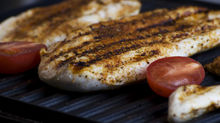National Nutrition Month: Quarantine meal planning guide
- hunutritionforyou
- Mar 30, 2020
- 3 min read

Right now the world is going through a time of tremendous change. As a global pandemic pans out, it is important to keep our health in top condition. Following a healthy eating pattern helps you build a strong immune system that can better fight off the virus. Since much of the country is under stay-at-home precautions for a week or more, it is also important to tailor this guide to those who need to plan out meals for 7 to 14 days. This guide can also be used by people who are under self-isolation or self-quarantine. Here are my top 7 tips to meal planning under quarantine:

1. Focus on vegetables to get your vitamins and minerals
Both fruits and vegetables are packed with vitamins and minerals that are essential to keeping your body working in optimal condition. If fruits are not readily available or are too expensive, swap them out for colorful vegetables. Bell peppers, carrots, leafy greens, and other vegetables have nutrients like vitamin C, vitamin K, vitamin A, iron, and potassium. If fresh fruits and vegetables are not readily accessible, feel free to substitute them for the canned and frozen versions which still offer many nutrients.

2. Make non-perishables the basis of meals
Because of the longevity of non-perishable food items like pasta, lentils, and canned goods, it is best to make these foods the base of all meals. This will allow the stores of food to last longer. Add perishable foods like fresh produce to make the meals complete.

3. Use perishables first when cooking for the week
While non-perishables have a greater shelf life, the opposite holds true for perishable food items. Perishable foods are fresh uncooked items like fruits, vegetables, milk, and meat. To prevent these foods from rotting and spoiling, use these ingredients first when cooking for the entire week.

4. Freeze anything you don’t use
Any vegetables or leftovers that are not used at first can be held in the freezer for up to 2 weeks. The quality of the food will not be severely affected. Just reheat leftovers (on the stove, preferably) and unthaw frozen vegetables before using them in recipes. To avoid freezer burn, use airtight containers to store food.

5. Buy goods that last longer
There are certain foods that last longer inside and outside the refrigerator and therefore can be a staple in the house during these trying times. They are less likely to spoil within a week. Apples, oranges, and cabbage can last longer when held inside the refrigerator, while foods like winter squash and potatoes generally last long if held outside the refrigerator.

6. Buy fortified foods
While staying at home or under quarantine, it may be hard to go outdoors and get some sunlight. That means it will be harder to get adequate amounts of vitamin D. In order to get enough vitamin D, buy milk, cereal, and other foods that are fortified with vitamin D.

7. If you need to call delivery, get something you would have cooked
Do not beat yourself up if you have to order delivery at some point. In that case, try to order something that you would cook yourself, rather than fast food items.
With these tips ready for your use, it can be easier to keep your immune system at its best. Stay healthy and safe to the best of your ability!














































Comments